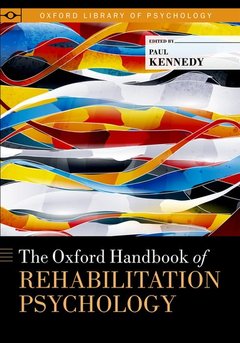Description
The Oxford Handbook of Rehabilitation Psychology
Oxford Library of Psychology Series
Coordinator: Kennedy Paul
Language: English
Subjects for The Oxford Handbook of Rehabilitation Psychology:
Publication date: 08-2012
624 p. · 25.7x18.8 cm · Hardback
624 p. · 25.7x18.8 cm · Hardback
Description
/li>Contents
/li>Biography
/li>
Rehabilitation psychology is one of the fastest growing fields in applied psychology and involves the application of psychological knowledge and skills to the understanding and treatment of individuals with physical disabilities. Rehabilitation psychologists aim to optimize outcomes in terms of health, independence, and daily functioning while also minimizing secondary health problems. The Oxford Handbook of Rehabilitation Psychology provides background and overview of the associated psychological processes and types of interventions that are critical in managing the consequences of disability and chronic disease. Psychological models and research have much to contribute to those working with the physical disabilities; this volume has a broad cognitive behavioral focus within the general banner of the biopsychosocial framework. The editor has successfully brought together contributions from a range of well-established and experienced researchers and practitioners from a wide variety of clinical and academic contexts. They highlight the critical psychological aspects, review applied interventions, and consider the wider conceptual, clinical and professional themes associated with disability and society.
Part One: Perspectives in Rehabilitation Psychology. 1. Rehabilitation Psychology: Introduction, Review, and Background. Paul Kennedy. 2. A Field in Flux: The History of Rehabilitation Psychology. Elisabeth Sherwin. 3. Psychological Models in Rehabilitation Psychology. Joseph F. Rath and Timothy R. Elliott. 4. Adjustment to Chronic Illness and Disability: Theoretical Perspectives, Empirical Findings, and Unresolved Issues. Hanoch Livneh and Erin Martz. 5. Epidemiological Context and Concerns. Yuying Chen and Yue Cao. 6. Rehabilitation Outcomes and Assessment: Toward a Model of Complex Adaptive Rehabilitation. Nancy Hansen Merbitz, Charles T. Merbitz, and Judy P. Ripsch. 7. Organization and Planning Person-Centered Hospital-Based Rehabilitation Services. Emilie F. Smithson and Paul Kennedy. 8. An Emerging Role for the Rehabilitation Psychologist in Community Rehabilitation Service Delivery. Craig Ravesloot and Tom Seekins. 9. Families in Rehabilitation. Patricia A. Rivera. 10. Children with Chronic Health Conditions. Kathleen K. M. Deidrick and Elena Harlan Drewel. 11. Aging, Rehabilitation, and Psychology. Adam T. Gerstenecker and Benjamin T. Mast. Part Two: Clinical Contexts and Applications. 12. Multiple Sclerosis. Kenneth I. Packenham. 13. Stroke and Rehabilitation: Psychological Perspectives. Jane Barton. 14. Traumatic Brain Injury. Robyn L. Tate. 15. Post-Acute Rehabilitation. Jerri Morris. 16. Spinal Cord Injuries. Paul Kennedy and Emilie F. Smithson. 17. Persistent and Chronic Pain. Elizabeth J. Richardson and J. Scott Richards. 18. Pulmonary Rehabilitation in Chronic Obstructive Pulmonary Disease. Margreet Scharloo, Maarten J. Fischer, Esther van den Ende, and Adrian A. Kapstein. 19. Cardiovascular Rehabilitation. Paul Bennett. 20. Limb Amputation. Deirdre M. Desmond, Laura Coffey, Pamela Gallagher, Malcolm MacLachlan, Stephen T. Wegener, and Fiadhnait O'Keeffe. 21. Transplantation. Bruce Rybarczyk, Andrea Shamaskin, Douglas Gibson, and Solam T. Huey. Part Three: Professional Issues and Future Challenges. 22. Education and Training in Rehabilitation Psychology. William Stiers and Kathryn Nicholson Perry. 23. Ethics in Psychology: Expanding Horizons. Thomas R. Kerkhoff and Stephanie L. Hanson. 24. Vocational Rehabilitation, Inclusion, and Social Integration. Carol Blessing, Thomas P. Golden, Sukyeong Pi, Susanne Bruyere, and Sara Van Looy. 25. Resilience in People with Physical Disabilities. Ashley Craig. 26. The Expert Patient and the Self-Management of Chronic Conditions and Disabilities. Michelle A. Meade and Linda A. Cronin. 27. Health Legislation and Public Policies. Nancy Cheak-Zamora, Stephanie A. Reid-Arndt, Kristofer J. Hagglund, and Robert G. Frank. 28. Disease Prevention through Lifestyle Interventions for Diet and Physical Activity. Stephen D. Anton and Michael G. Perri. 29. Aspects of Culture Influencing Rehabilitation and Persons with Disabilities. Elias Mpofu, Julie Chronister, Ebonee T. Johnson, and Geoff Denham. 30. Rehabilitation Psychology and Global Health. Malcolm MacLachlan. 31. Rehabilitation Psychology: The Continuing Challenge. Paul Kennedy.
Paul Kennedy, D.Phil., MSc., FBPsS., C.Psychol., is Professor of Clinical Psychology and Academic Director, Oxford Doctoral Course in Clinical Psychology, University of Oxford.
© 2024 LAVOISIER S.A.S.




